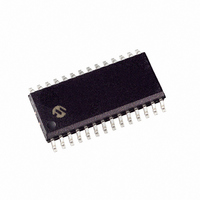PIC18F2525-I/SO Microchip Technology, PIC18F2525-I/SO Datasheet - Page 248

PIC18F2525-I/SO
Manufacturer Part Number
PIC18F2525-I/SO
Description
IC MCU FLASH 24KX16 28SOIC
Manufacturer
Microchip Technology
Series
PIC® 18Fr
Datasheets
1.PIC18F2221-ISO.pdf
(46 pages)
2.PIC18F2525-ISO.pdf
(412 pages)
3.PIC18F2525-ISO.pdf
(18 pages)
4.PIC18F2525-ISO.pdf
(18 pages)
5.PIC18F2525-ISO.pdf
(6 pages)
6.PIC18F2525-ISO.pdf
(6 pages)
7.PIC18LF4620-IP.pdf
(390 pages)
Specifications of PIC18F2525-I/SO
Program Memory Type
FLASH
Program Memory Size
48KB (24K x 16)
Package / Case
28-SOIC (7.5mm Width)
Core Processor
PIC
Core Size
8-Bit
Speed
40MHz
Connectivity
I²C, SPI, UART/USART
Peripherals
Brown-out Detect/Reset, HLVD, POR, PWM, WDT
Number Of I /o
25
Eeprom Size
1K x 8
Ram Size
3.8K x 8
Voltage - Supply (vcc/vdd)
4.2 V ~ 5.5 V
Data Converters
A/D 10x10b
Oscillator Type
Internal
Operating Temperature
-40°C ~ 85°C
Processor Series
PIC18F
Core
PIC
Data Bus Width
8 bit
Data Ram Size
3986 B
Interface Type
SPI, I2C, EUSART
Maximum Clock Frequency
40 MHz
Number Of Programmable I/os
25
Number Of Timers
1 x 8
Operating Supply Voltage
4.2 V to 5.5 V
Maximum Operating Temperature
+ 85 C
Mounting Style
SMD/SMT
3rd Party Development Tools
52715-96, 52716-328, 52717-734, 52712-325, EWPIC18
Development Tools By Supplier
PG164130, DV164035, DV244005, DV164005, PG164120, ICE2000, ICE4000, DM163022, DV164136
Minimum Operating Temperature
- 40 C
On-chip Adc
10 bit
Package
28SOIC W
Device Core
PIC
Family Name
PIC18
Maximum Speed
40 MHz
Lead Free Status / RoHS Status
Lead free / RoHS Compliant
For Use With
XLT28SO-1 - SOCKET TRANSITION 28SOIC 300MILI3DB18F4620 - BOARD DAUGHTER ICEPIC3
Lead Free Status / Rohs Status
Lead free / RoHS Compliant
Available stocks
Company
Part Number
Manufacturer
Quantity
Price
Company:
Part Number:
PIC18F2525-I/SO
Manufacturer:
HITTITE
Quantity:
101
- PIC18F2221-ISO PDF datasheet
- PIC18F2525-ISO PDF datasheet #2
- PIC18F2525-ISO PDF datasheet #3
- PIC18F2525-ISO PDF datasheet #4
- PIC18F2525-ISO PDF datasheet #5
- PIC18F2525-ISO PDF datasheet #6
- PIC18LF4620-IP PDF datasheet #7
- Current page: 248 of 412
- Download datasheet (7Mb)
PIC18F2525/2620/4525/4620
FIGURE 22-3:
22.5
In many applications, the ability to detect a drop below
or rise above a particular threshold is desirable. For
example, the HLVD module could be periodically
enabled to detect a Universal Serial Bus (USB) attach
or detach. This assumes the device is powered by a
lower voltage source than the USB when detached. An
attach would indicate a high-voltage detect from, for
example, 3.3V to 5V (the voltage on USB) and vice
versa for a detach. This feature could save a design a
few extra components and an attach signal (input pin).
For general battery applications, Figure 22-4 shows a
possible voltage curve. Over time, the device voltage
decreases. When the device voltage reaches voltage
V
The interrupt could cause the execution of an ISR,
which would allow the application to perform “house-
keeping tasks” and perform a controlled shutdown
before the device voltage exits the valid operating
range at T
tion a time window, represented by the difference
between T
DS39626E-page 246
A
, the HLVD logic generates an interrupt at time T
CASE 1:
CASE 2:
Enable HLVD
Enable HLVD
Applications
A
B
. The HLVD, thus, would give the applica-
and T
HLVDIF
HLVDIF
IRVST
IRVST
V
V
B
DD
DD
, to safely exit.
HIGH-VOLTAGE DETECT OPERATION (VDIRMAG =
HLVDIF may not be set
Internal Reference is stable
Internal Reference is stable
T
T
IRVST
IRVST
A
.
HLVDIF cleared in software,
HLVDIF remains set since HLVD condition still exists
FIGURE 22-4:
V
V
A
B
Legend:
HLVDIF cleared in software
V
V
A
B
1
= HLVD trip point
= Minimum valid device
)
TYPICAL LOW-VOLTAGE
DETECT APPLICATION
© 2008 Microchip Technology Inc.
operating voltage
Time
HLVDIF cleared in software
T
A
V
V
LVD
LVD
T
B
Related parts for PIC18F2525-I/SO
Image
Part Number
Description
Manufacturer
Datasheet
Request
R

Part Number:
Description:
IC MCU FLASH 16KX16 EE 28SOIC
Manufacturer:
Microchip Technology
Datasheet:

Part Number:
Description:
IC MCU FLASH 16KX16 EE 28DIP
Manufacturer:
Microchip Technology
Datasheet:

Part Number:
Description:
IC MCU CMOS 40MHZ 16K FLSH28SOIC
Manufacturer:
Microchip Technology
Datasheet:

Part Number:
Description:
IC MCU CMOS 40MHZ 16K FLSH 28DIP
Manufacturer:
Microchip Technology
Datasheet:

Part Number:
Description:
8-bit Microcontrollers - MCU 32KB 1536 RAM 23I/O
Manufacturer:
Microchip Technology

Part Number:
Description:
PIC18F With 128-segment LCD Driver And 12-bit ADC, 8KB Flash, 768B RAM, CCP, MSS
Manufacturer:
Microchip Technology
Datasheet:

Part Number:
Description:
PIC18F With 128-segment LCD Driver And 12-bit ADC, 16KB Flash, 768B RAM, CCP, MS
Manufacturer:
Microchip Technology
Datasheet:

Part Number:
Description:
PIC18F With 192-segment LCD Driver And 12-bit ADC, 8KB Flash, 768B RAM, CCP, MSS
Manufacturer:
Microchip Technology
Datasheet:

Part Number:
Description:
PIC18F With 192-segment LCD Driver And 12-bit ADC, 16KB Flash, 768B RAM, CCP, MS
Manufacturer:
Microchip Technology
Datasheet:

Part Number:
Description:
Microcontrollers (MCU) 48KB 3328 RAM 52 I/O
Manufacturer:
Microchip Technology
Datasheet:

Part Number:
Description:
Microcontrollers (MCU) 64KB 3328 RAM 52 I/O
Manufacturer:
Microchip Technology
Datasheet:

Part Number:
Description:
32kB Flash, 2kB RAM, 1kB EE, NanoWatt XLP, LCD 64 QFN 9x9x0.9mm T/R
Manufacturer:
Microchip Technology
Datasheet:

Part Number:
Description:
32kB Flash, 2kB RAM, 1kB EE, NanoWatt XLP, LCD 64 TQFP 10x10x1mm T/R
Manufacturer:
Microchip Technology
Datasheet:

Part Number:
Description:
128kB Flash, 4kB RAM, 1kB EE, 16MIPS, NanoWatt XLP, LCD, 5V 80 TQFP 12x12x1mm T/
Manufacturer:
Microchip Technology
Datasheet:












